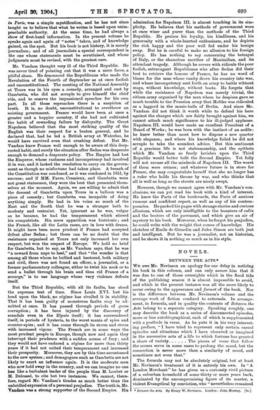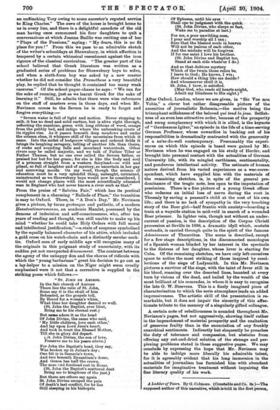WE owe Mr. Nevinson an apology for our delay in
noticing his book in this column, and can only assure him that it was due to one of those oversights which in the flood tide of the publishing season it is almost impossible to avoid, and which in the present instance was all the more likely to occur owing to the appearance and format of the book. Nor is the difference between Mr. Nevinson's volume and the average work of fiction confined to externals. In arrange- ment, in formula, and in quality the contents of Between the Acts belong to a separate category. Speaking roughly, one may describe the book as a series of disconnected episodes, more or less autobiographical, each of which is supplemented with a postlude in verse. As he puts it in his very interest- ing preface, "I have tried to represent only certain casual episodes and situations which I have observed or imagined in the successive acts of a life to which fortune has granted a share of variety The pieces of verse that follow the scenes serve in some cases to prolong the mood, but the connection is never more than a similarity of mood, and sometimes not even that."
The formula may not be absolutely original, but at least Mr. Nevinson's treatment of it is entirely his own. In "A. London Merchant" he has given us a curiously vivid picture of a suburban household of some thirty or more years back, dominated by the uncompromising figure of its master, a violent Evangelical by conviction, who "nevertheless remained • Between the Acts. By Henry W. Nevinaon. London : John Murray. [93.]
an unflinching Tory owing to some ancestor's reputed service to King Charles." The aura of the house is brought home to us in every line, and there is a delightful anecdote of the old man having once summoned his four daughters to quit a conversazione at which Joanna Baillie was reciting one of her "Plays of the Passions," saying : "My dears, this is no fit place for you!" From this we pass to an admirable sketch of the writer's schooldays at Shrewsbury, in which affection is tempered by a certain whimsical resentment against the iron rigours of the classical curriculum. "The greater part of the school believed that Greek literature was written as a graduated series of problems for Shrewsbury boys to solve, and when a sixth-form boy was asked by a new master whether he did not consider the Prometheus a very beautiful play, he replied that he thought it contained too many weak caesuras." Of the school paper-chases he says : "We ran for the sake of running, just as we learnt Greek for the sake of learning it." Still, he admits that there were wise reformers on the staff of masters even in those days, and when Mr. Nevinson comes to the Severn he is ready to forget and forgive everything :—
" Severn water is full of light and motion. Never stopping to sulk, it has no dead and solid surface, but is alive right through, reflecting the sunshine, green with long ribbons of weed, orange from the pebbly bed, and indigo where the uxibreaking crests of its ripples rise. As it passes beneath deep meadows and under the solemn elms, it whispers still of the mountains from which it came. Into the midst of hedgerow villages and ordered fields it brings its laughing savagery, telling of another life than theirs, of rocks and sounding falls and moorland watersheds. Other rivers may be called majestic, and we talk of Father Tiber or Father Thames, but no one ever called the Severn father, or praised her but for her grace; for she is like the body and soul of a princess straight from a western fairyland—so wild and pliant, so full of laughter and of mystery, so uncertain in her gay and sorrowing moods. On my word, though the science of education must be a very splendid thing, untaught, untrained, uninstructed as we Shrewsbury boys would now be considered, I would not change places with the most scientifically educated man in England who had never known a river such as that."
From the praise of "Sabrina Fair," which has its poetical complement in a charming "Ballade of Place," the transition is easy to Oxford. There, in "A Don's Day," Mr. Nevinson gives a picture, by turns grotesque and pathetic, of a modern Heautantimorumenus, an academic Hamlet, possessed by the demons of indecision and self-consciousness, who, after ten years of reading and thought, was still unable to make up his mind "whether he could take Holy Orders with full moral and intellectual justification,"—a state of suspense symbolised by the equally balanced character of his attire, which included a gold cross on his watch-chain and a distinctly secular neck. tie. Oxford men of early middle age will recognise many of the originals in this poignant study of uncertainty, with its sudden yet not unexpected dcf.nouement. The contrast between the agony of the unhappy don and the chorus of ridicule with which the "young barbarians" greet his decision to go out as a lay-helper to a mission on the Niger might seem cruelly emphasised were it not that a corrective is supplied in the striking poem which follows:— " ST. JOHN DE AMIENS.
In the fair church of Amiens
There lies the relic of St. John, Some say it is the skull of him Beheaded, as the gospels tell, By Herod for a woman's whim, What time her daughter danced so well.
(St. John the Baptist, ever blest, Bring me to his eternal rest.) But some adore it as the head Of John Divine, the same who said, My little children, love each other,'
And lay upon Lord Jean's heart,
And took in trust the Blessed Mother, Till she in glory did depart.
k3t. John Divine, the son of lore, Preserve me to his peace above.) For John the Baptist's head, they say,
Was broken up in Julian's day ; One bit is in Samaria's town, And two beneath Byzantium's dome, And Genoa has half the crown, The nose r.nd forehead rest in Rome.
(St. John the Baptist's scattered dust Bring me to kingdoms of the just.) But there are others say again St. John Divine escaped the pain Of death's last conflict, for he lies Still sleeping in his bishopric
• Of Ephesus, until his eyes Shall ope to judgment with the quick. (St. John Divine, who sleeps so fast, Wake me to paradise at last.)
For me, a poor unwitting man, I pray and worship all I can; Sure that the blessed souls in heaven Will not be jealous of each other, And the mistake will be forgiven If for one saint I love his brother.
(St. John Divine and Baptist too, Stand at each side whate'er I do.) And so that dubious mystery Which of the twain those relics be, I leave to God ; He knows, I wis ; How should a thing like me decide?
And whosesoever skull it is, St. John, I trow, is satisfied.
(May God, who reads all hearts aright, Admit my blindness to His sight.)
After Oxford, London, where we are given, in "Sic Yoe non Vobis," a clever but rather disagreeable picture of the amenities of journalistic Bohemia,—the motive being the triumphant selfishness of the beloved qui tend la jaw. Selfish-
ness of an even less attractive order, because of the prosperity and smug complacency with which it is allied, is the keynote of " Gaudeamus Igitur," an episode in the life of a time-serving German Professor, whose cowardice in backing out of his responsibilities is dramatically contrasted with the generosity of a ne'er-do-well contemporary. Presumably the experi- ences on which this episode is based were gained by Mr. Nevinson when he was engaged on his study of Herder, and brought into personal contact with the actualities of German University life, with its mingled earthiness, sentimentality, and ponderous intellectual activity. The estimate of human nature derived from his varied experiences as a war-corre- spondent, which have supplied him with the materials of the remaining sketches, is, in spite of the general pre- dominance of the tragic note, less open to the imputation of pessimism. There is a fine picture of a young Greek officer who redeems an initial loss of nerve during the rout in
Thessaly by saving a peasant's child at the cost of his own life ; and there is no lack of sympathy in the very touching story of the Boer girl—half frantic with anxiety—boarding a train at a wayside station in mid-veld in search of a wounded Boer prisoner. In lighter vein, though not without an under-
current of passion, is the description of the Corpus Christi procession at Seville in 1898, a dramatic idyll which, mutatis
mutandis, is carried through quite in the spirit of the famous Adoniazu,sae of Theocritus. The scene is described, except
for a few stage descriptions, in the disconnected monologue of a Spanish woman blinded by her interest in the spectacle to the distress of her daughter, whose lover is starting for Cuba. Of the remaining sketches, we have only left ourselves space to notice the most striking of those inspired by recol- lections of the siege of Ladysmith. In this Mr. Nevinson pictures a survivor of the siege, with the taint of fever still in his blood, roaming over the deserted lines, haunted at every turn by visions of the dead, and hailed by the wraith of the most brilliant of his comrades, in whom it is easy to recognise the late G. W. Steevens. This is a finely imagined piece of characterisation to which the eerie atmosphere lends an added impressiveness. The artistic skill of the presentation is re- markable, but it does not impair the sincerity of this affec- tionate tribute to the memory of a singularly gifted colleague.
A certain note of rebelliousness is sounded throughout Mr. Nevinson's pages, but not aggressively, showing itself rather in the impeachment of material prosperity and the exaltation of generous frailty than in the enunciation of any frankly anarchical sentiments. Indirectly but eloquently he preaches the duty of tolerance and compassion, but abstains from offering any cut-and-dried solution of the strange and per- plexing problems stated in these suggestive pages. We may conclude by expressing the hope that Mr.. Nevinson may be able to indulge more liberally his admirable talent, for it is agreeably evident that his long immersion in the actualities of journalism has furnished him with abundant materials for imaginative treatment without impairing the fine literary quality of his work.























































 Previous page
Previous page